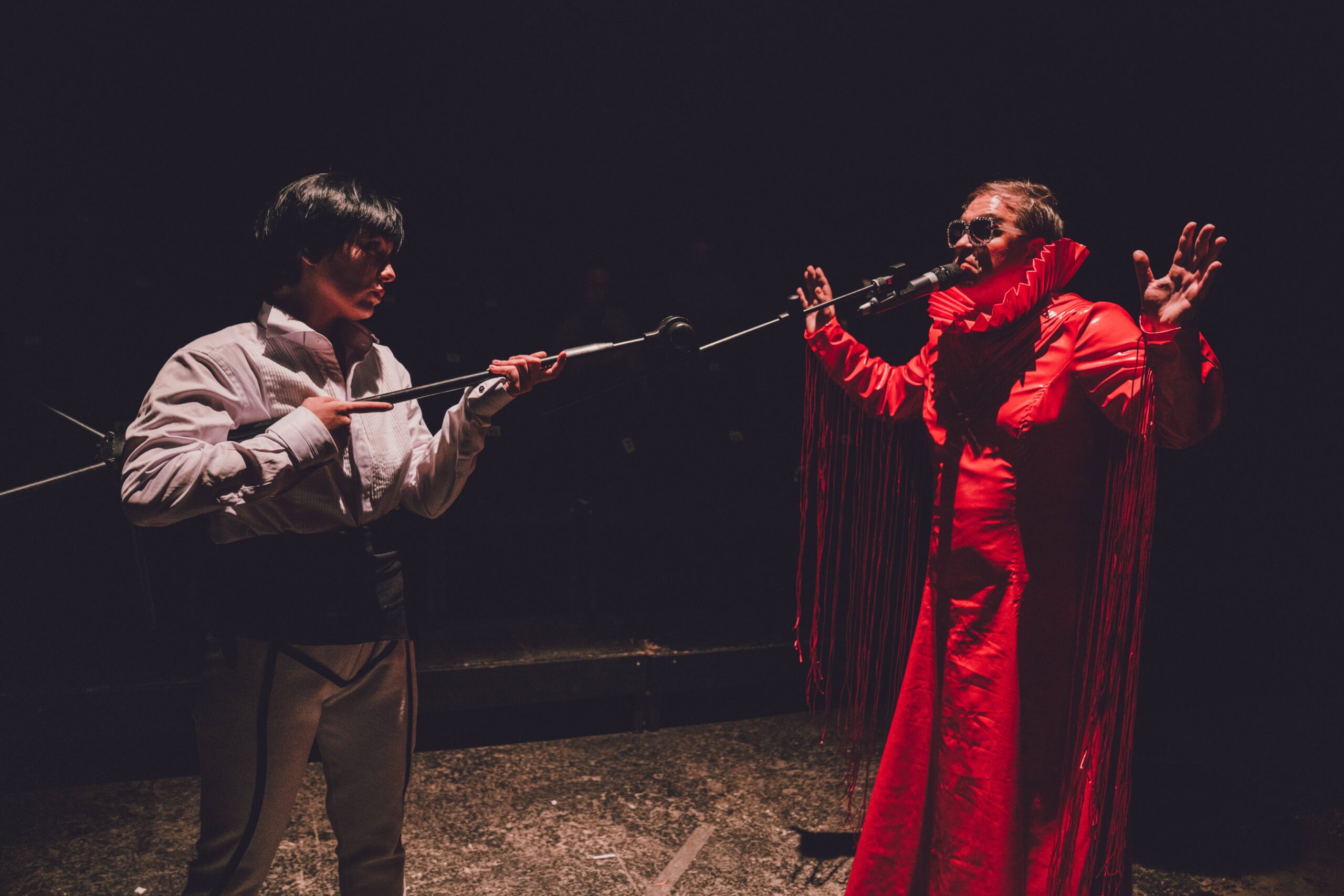Teatri Oda, Prishtina, premiered 10th May 2022
It is a truth universally acknowledged, that over the centuries, patriarchal societies, being governed by men, have invented different mechanisms to limit women’s freedom of space, expression and life, making them live their lives in accordance with men’s view of the world.
Among these many mechanisms is also a phenomenon derived from Lekë Dukagjini’s Kanun, a code of law employed in Northern Albania. The ‘sworn virgins,’ known as “Burrneshat” in Albanian, are women who have taken an irreversible oath to live their lives as men, wearing men’s clothes, working, conversing and doing everything that men did in those mountain lands.
In order to do this, they had to pay a price imposed on them by a patriarchal society. Once ‘Burrneshat’ have sworn their oath to become ‘social men’ they can never engage in sexual relationships.
Jeton Neziraj’s play, Burrnesha, exposes this complex social phenomenon, merging it with more modern issues of commercialization and consumption.
The title is ironic as a Kosovar might call a girl a burrnesha if she shows strength, bravery and decisiveness, all of which are supposedly the attributes of men alone.
Neziraj manages to mine some extremely thought-provoking and timely drama from this part of Northern Albanian history. The play masterfully uses its ironic lens to create a piece of modern and – partially – feminist theatre.
The play is well-executed by the cast of three actors, while director’s Erson Zymberi coordination of the performers keeps the show well-paced and engaging.
Edith (played fabulously by Semira Latifi) is a Professor of Anthropology at the University of London. The name of her character seems intended as a reference to Edith Durham, the British anthropologist who wrote accounts of the customs, tradition and society of the highlands of northern Albania in the early 20th century.
At the start of the play, Edith is giving a lecture to her students about the ‘exotic, extraordinary’ phenomenon of the burrneshat deep in the Albanian mountains. She is curious to delve deeper into the matter, and so are her students, so she takes to the road, travelling to Albania to meet a real-life Burrnesha named Sos, formerly Sosa.
Sos (Tringa Hasani) meets greets Edith in the most hospitable way and the two have a conversation. Hasani reveals the psychology of Sos’s character, but only to a certain degree. There are moments where the performance seems to lack emotional nuance. However this might also be due to the fact that Sos, having shut herself down to live like a man, has also shut down her ability to transmit her emotions to the people she meets.

Burrnesha
Sos has had to conform to the rules of her society to win her “freedom.” She must behave like a man, and men in these parts are meant to be strong and honourable. They never shed a tear in public. She tells Edith that “One feels as one wants to feel”, though she also reveals that her female biology betrays her sometimes.
The setting shifts between two locations, between Albania and London. The set and the audience are divided in two parts by the scenography of Burim Korça. One side looks to be an “Oda e burrave” or room for men, where a ‘qilim’ – an Albanian traditional handmade rug is digitally projected on the floor, (lighting designed by Mursel Bektesh), the other space is Soho Theatre in London, where drag queen Julian (played by Kushtrim Qerimi) is keen to put on a new show. On hearing about Sos’s story from Edith, he is hungry to put her in front of an audience. Julian begs his long-time benefactor to finance the project, which he hopes will be a hit.
However, no one is interested in the burrnesha’s life story as it really is. Both Julian and Edith want to modify the story of Sos. But she cannot lie, she can only tell her truth, because Sos has led an honest life.
In this way, Neziraj’s play explores the Western obsession with the Burrnesha, and the way international journalists and researchers often exploit and distort the phenomenon, depicting it as being a product of a primitive society.
The play also warns that a consumer-driven society, one that swallows everything it is served, is susceptible to these deceptions, and when dense academic language is used, the truth can get even more distant and blurry.
People like Julian are distorting actual events by constructing new narratives that bear little relation to reality. According to tradition, the burrneshat chose to live in this way either because their household had no man, or they wanted to have some of the same liberties as men – and the only way to have access to them was to become a burrnesha.
But can a burrnesha ever be a man? Even if she deepens her voice so it sounds more like a man’s, or wears a shoka (an Albanian woollen scarf usually layered several times over the waist)? Sos wears this scarf over her breasts, so they are not noticeable anymore. Even if she cuts her hair short, will her body still betray her when her period comes?
The play merges two worlds – one from the past, in which the burrnesha has to choose a limited and constrained way of life in order to enjoy the same freedom as men, while at the same time abstaining from physical desire – and that of the modern world where people are happy to produce degrading content for personal gain.
Ultimately the play Burrnesha depicts a clash between two cultures and ideologies, both of which are perilous in their own way if left unexamined and unquestioned.
Credits:
Author: Jeton Neziraj// Director: Erson Zymberi
Cast: Semira Latifi, Kushtrim Qerimi,Tringa Hasani
Producer: Qendra Multimedia
Further reading: Balkan Bordello – on the road with the Great Jones rep company
Florida is a lover of words, and of art in all its forms: fiction, poetry and drama.








